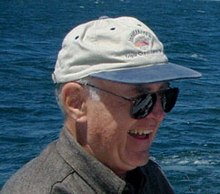This is an old revision of this page, as edited by Carcharoth (talk | contribs) at 13:08, 26 October 2007 (add Pescadero reference - see talk page). The present address (URL) is a permanent link to this revision, which may differ significantly from the current revision.
Revision as of 13:08, 26 October 2007 by Carcharoth (talk | contribs) (add Pescadero reference - see talk page)(diff) ← Previous revision | Latest revision (diff) | Newer revision → (diff)| Gordon Moore | |
|---|---|
 | |
| Born | (1929-01-03) January 3, 1929 (age 96) San Francisco, California |
| Occupation(s) | Retired / Chairman Emeritus, co-founder and former Chairman and CEO of Intel Corporation |
Gordon Earle Moore (b. January 3, 1929 in San Francisco, California) is the co-founder and Chairman Emeritus of Intel Corporation and the author of Moore's Law (published in an article 19 April 1965 in Electronics Magazine).
Moore was born in San Francisco, California, but his family lived in nearby Pescadero where he grew up. He received a B.S. degree in Chemistry from the University of California, Berkeley in 1950 and a Ph.D. in Chemistry and Physics from the California Institute of Technology (Caltech) in 1954. Prior to studying at Berkeley, he spent his freshman and sophomore years at San José State University, where he met his future wife Betty.
He joined Caltech alumnus William Shockley at the Shockley Semiconductor Laboratory division of Beckman Instruments, but left with the "Traitorous Eight", when Sherman Fairchild agreed to back them and created the influential Fairchild Semiconductor corporation.
Moore set off his first boom in Silicon Valley two decades before pioneering the design of the integrated circuit. He co-founded Intel Corporation in July of 1968, serving as Executive Vice President until 1975 when he became President and Chief Executive Officer. In April 1979, Dr. Moore became Chairman of the Board and Chief Executive Officer, holding that position until April 1987, when he became Chairman of the Board. He was named Chairman Emeritus of Intel Corporation in 1997.
In 2001, Moore and his wife donated $600 million to Caltech, the largest gift ever to an institution of higher education. He said that he wants the gift to be used to keep Caltech at the forefront of research and technology. Moore was chairman of Caltech's board of trustees from 1994 to 2000, and continues as a trustee today. In 2003, he was elected a Fellow of the American Association for the Advancement of Science.
The library at the Centre for Mathematical Sciences at the University of Cambridge is named after him and his wife Betty, as is the Moore Laboratories building (dedicated 1996) at Caltech.
With his wife he endowed the Gordon and Betty Moore Foundation.
See also
External links
- The Fairchild Chronicles
- Gordon E. Moore Association by the Horatio Alger Foundation
- Factors opposing the continuation of Moore's Law
- Betty and Gordon Moore Library
- Biography at Intel website
- Oral history – As part of the Stanford Silicon Valley Project
- Forbes.com: Forbes World's Richest People
- Moore says nanoelectronics face tough challenges – By Michael Kanellos, CNET News.com, 9 March 2005
- A Wired News article
- Interview with Caltech News
- Dedication of Moore Labs at Caltech
- The Accidental Entrepreneur, (Gordon E. Moore): From Caltech to Intel
| Preceded byRobert Noyce | Intel CEO 1975–1987 |
Succeeded byAndrew Grove |
- Computer pioneers
- Intel people
- American businesspeople
- Physical chemists
- National Medal of Technology recipients
- Perkin Medal
- University of California, Berkeley alumni
- California Institute of Technology alumni
- San José State University alumni
- 1929 births
- Living people
- People from San Francisco
- Presidential Medal of Freedom recipients